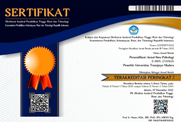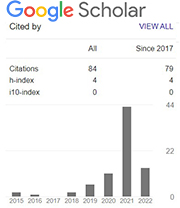Peran Work Self Efficacy terhadap Job Crafting pada Guru SMA di Kota Kediri
Abstract
Job crafting merupakan merupakan bentuk perubahan dari inisiatif karyawan untuk menyeimbangkan sumber daya dan tuntutan pekerjaan yang diperlukan untuk melatih inisiatif dan kreativitas guru. Oleh sebab itu dibutuhkan work self efficacy untuk meningkatkan kemampuan job crafting guru. Tujuan dari penelitian ini adalah untuk mengetahui peran work self efficacy terhadap job crafting pada guru. Responden dalam penelitian ini berjumlah 205 guru SMA di Kota Kediri. Jenis penelitian ini adalah kuantitatif kausal komparatif dengan teknik pengumpulan data menggunakan skala work self efficacy dan skala job crafting. Teknik analisis data dalam penelitian ini menggunakan teknik regresi linier sederhana dengan nilai F hitung sebesar 13,002 dan taraf signifikansi p=0,001 (p lebih kecil dari 0,05) yang menunjukkan bahwa ada peran yang signifikan antara work self efficacy terhadap job crafting. Hasil analisis sumbangan efektif menunjukkan bahwa work self efficacy berkontribusi sebesar 6% terhadap job crafting pada guru. Semakin tinggi work self efficacy maka akan meningkatkan job crafting guru.
Keywords
Full Text:
PDF (Bahasa Indonesia)References
Alwisol. (2012). Psikologi Kepribadian. Malang : UMM Press
Avallone, F. (2007). Autoefficaci Percepita Nella Ricerca Del Lavoro : Scale di Misura. In Isfol, Bigsoni, Valori e Autoefficacia Nella Scelta del Lavoro. Roma : ISFOL, 133-142
Azis, M.R., & Novieayati, I. (2016). Dukungan Sosial, Efikasi Diri dan Resiliensi pada Karyawan yang Terkena Pemutusan Hubungan Kerja. Persona : Jurnal Psikologi Indonesia. 5(1)
Azzahro., & Afifah Y. (2020). Hubungan antara Iklim Organisasi dengan Job Crafting pada Guru Pondok Modern X di Kabupaten Temanggung. (Tesis, Universitas Mercu Buana-Yogyakarta) http://eprints.mercubuana-yogya.ac.id/10204/
Bakker, A.B., & Demerouti, E. (2014). Job Demands-Resources Theory In P.Y Chen & C.L. Cooper. Work and Wellbeing, 37-64
Bandura, A. (1997). Self Efficacy the Exercise of Control. United States of America : W.H Freeman and Company
Bass, B., & Steidlmeier, P. (1999). Ethics, Character, and Authentic Transformational Leadership Behavior. Leadership Quartely. 10(2), 181-217
Barron, R.A., & Byrne, D. (2003). Psikologi Sosial. Jakarta : Erlangga
Bates. (2013). Self Efficacy and College Students Perceptions and use of Online Learning Systems. Computers in Human Behavior. 23(1), 175-191
Berg, J. M., Dutton, J. E., & Wrzesniewski, A. (2013). Job Crafting and Meaningful Work. Purpose and Meaning in the Workplace. 81-104
Dlamini, C.S., Okeke, C.I., Mammen, K.J. (2014). An Investigation of Work-Related Stress Among High School Teachers in the Region of Swaziland. Medditeranean Journal of Social Sciences. 5(15), 575-586
Federman, B. (2009). A Roadmap for Creating Profits, Optimizing Performance, and Increasing Loyalty. San Francisco : Jossey-Bass A Wiley Imprint
Fitri, K. (2013). Pengaruh Jenjang Karir dan Tantangan Pekerjaan terhadap Minat Fresh Graduate FKIP Universitas Riau pada Profesi Sales. Jurnal Sosial Ekonomi Pembangunan. 10, 119-135
Fisher, C.D. (1993). Boredom at Work : A Neglected Concept. Human Relation. 4(6), 395-417
Gist, M.E., & Michell, T.R. (1992). Self Efficacy : A Theoritical Analysis of its Determinants and Malleability. The Academy of Management Review. 172(2), 183-211
Hersey & Blanchard, H.K. (2013). Kepemimpinan Birokrasi. Bandung : Alfabeta
Kanten, P. (2014). The Antecedents of Job crafting : Perceived Organizational Support, Job Characteristics, and Self Efficacy . European Journal of Business and Social Sciences. 3(5), 113-128
Kerlinger. (2006). Asas-Asas Penelitian Behaviour. Yogyakarta : Gadjah Mada University Press
Leiter, M.P. (1991). Pola Koping sebagai Prediktor Burnout : Fungsi Kontrol dan Pola Koping Pelarian. Jurnal Perilaku Organisasi. 12, 123-144
Louhenapessy, F., Idulfilastri, R.M., & Suyasa, P.T.Y.S. (2020). Peran Job Demands dan Job Resource terhadap Work Family Enrichment pada Guru di Sekolah X. Jurnal Muara Ilmu Sosial, Humaniora, dan Seni. 4(2), 458-467
Lyons, P. (2008). The Crafting of Jobs and Individual Differences. Journal of Business Psychology. 23(1-2), 25-36
Petrou, P., Demerouti, E., & Schaufeli, W.B. (2015). Job Cafting in Changing Organizations : Antecents and Implication for Exhaustion and Performance. Journal of Occupational Health Psychology. 20(4), 470-480
Republik Indonesia. (2018). Undang-Undang Republik Indonesia Nomor 12 Tahun 2018 tentang Pemenuhan Beban Kerja Guru, Kepala Sekolah dan Pengawas Sekolah. Jakarta : Menteri Pendidikan dan Kebudayaan Republik Indonesia
Robbins, S.P., & Judge, T.A. (2018). Perilaku Organisasi. Jakarta : Salemba Empat
Sadiqqi, M.A. (2015). Work Engagement and Job Crafting of Service Employess Influencing Customer Outcomes. The Journal of Decision Makers. 40(3), 277-292
Sayakura., Shimazu., Immamua., Namba., & Kawakami (2016). Job Crafting and demands
Sebastian, Y. (2016). Generasi Langgas Milnials Indonesia. Jakarta : Gagas Media
Singh, S. (2013). Estimating at least Seven Measures for Qualitative Variabels Using Randomized Response Sampling. Statistics & Probability Letters. 83(1), 399-104
Stephany, D., & Kurniawan, J.E. (2018). Hubungan antara Job Crafting dan Work Engagement pada Karyawan. Psychopreneur Journal. 2(1), 30-40
Thok, W. S. (2015). Kebiasaan buruk karyawan Indonesia. Diupload pada tanggal 24 Juni 2015 pukul 04:54 WIB. Diakses pada tanggal 22 Desember 2021pukul 21.45 WIB. http://www.kompasiana.com/ws-thok/kebiasaan-buruk-
Taradisa, N., Jarmita, N., & Emalfida. (2020). Kendala yang dihadapi Guru Mengajar Daring) pada Masa Pandemi Covid-19 di MIN 5 Banda Aceh. Banda Aceh : UIN Ar-Raniry Banda Aceh
Tims., Bakker, A.B., & Derks, D. (2012). Development and Validation of the Job crafting Scale. Journal of Vacational Behavior. 80(1), 173-186
Tims., Bakker, A.B., & Derks, D. (2016). Job Crafting and its Relationship with Person. Journal of Vocational Behavior. 92, 44-53
Umaya, F., Maulina, R., & Budiharto, S. (2020). Job Crafting dan Kebosanan Kerja Karyawan. Gadjah Mada Journal of Proffesional Psychology. 6(2), 165-176
Volman. (2011). Putting the Context Back in Job Crafting Research : Causes of Job Crafting Behavior. (Tesis, Tilburg University-Netherlands) http://arno.uvt.nl/show.cgi?fid=115918
Wahyudi, I. (2012). Mengejar Profesionalisme Guru. Jakarta : Prestasi Pustaka
White, J.M. (1999). Work Family Stage and Satisfaction with Work Family Balance. Journal of Comparative Family Studies. 30(2)
Windergen, J.V., Derks, D., Bakker, A.B. (2017). The Impact of Personal Resources and Job crafting Interventions on Work Engagement and Performance. Human Resource Management. 56(1), 51-67
Wrzesniewsi, A., & Dutton, J.E. (2001). Crafting a Job : Revisioning Employees as Active Crafters of Their Work. Academi if Management Review. 26(2), 179-201
DOI: https://doi.org/10.21107/personifikasi.v13i2.16483
Refbacks
- There are currently no refbacks.
Copyright (c) 2022 Willyta Syah Rodam

This work is licensed under a Creative Commons Attribution 4.0 International License.


Personifikasi by Universitas Trunojoyo Madura is licensed under a Creative Commons Attribution 4.0 International License.










